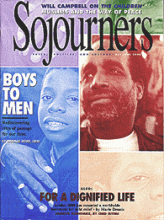Ruth Bornsteins The Dancing Man relates the story of an orphan boy, Joseph, who lives in a dreary village where life is hard and the people are laughless. Worst of all, no one dances.
One evening, an old man appears before Joseph and, stepping slowly, offers him a giftdancing shoes. For years, the boy dances in these shoes, bringing great joy to many who live in the multitude of dreary villages throughout the region. But eventually Joseph grows old and tires. He can no longer dance, even though he knows the world will return to its dreariness without the gift he offers.
Just as he can go no further, he spots a young boy alone on the beach. Joseph dances up to the boy, sweeps off his hat, and declares, "Im the Dancing Man, and I have a gift for you...."
Parents have long worried about passing on their moral systems to the next generation. Will our beliefs, values, and hopes end with our generation? Will the good news become old news? Parents whose faith calls them to address issues of social injustice experience an added burdento pass on a world ever more just and peace-filled. From generation to generation, stories and experiences are passedsometimes more effectively than others.
"Family Matters" is a new column intended to explore the interactions between and within generations, to explore the meaning of family in a postmodern culture. Here such topics as changing lifestyles to include aging parents, modeling just gender roles, and balancing work and parenting will be considered. One issue confronting activist parents when sabers are rattled is the inclusion of children in protest activities.
Read the Full Article
